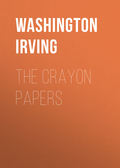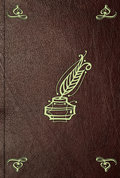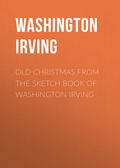
Вашингтон Ирвинг
The Student's Life of Washington; Condensed from the Larger Work of Washington Irving
The reverence and affection expressed for him in both Houses of Congress, and their regret at his intended retirement, were in unison with testimonials from various State legislatures and other public bodies, which were continually arriving since the publication of his Farewell Address.
During the actual session of Congress, Washington endeavored to prevent the misunderstandings, which were in danger of being augmented, between the United States and the French Government. In the preceding month of November, Mr. Adet, the French minister, had addressed a letter to the Secretary of State, recapitulating the complaints against the government of the United States made by his predecessors and himself, denouncing the insidious proclamation of neutrality and the wrongs growing out of it, and using language calculated to inflame the partisans of France; a copy of which letter had been sent to the press for publication. One of the immediate objects he had in view in timing the publication was supposed by Washington to be to produce an effect on the presidential election; his ultimate object, to establish such an influence in the country as to sway the government and control its measures. Early in January, 1797, therefore, Washington requested Mr. Pickering, the Secretary of State, to address a letter to Mr. Pinckney, United States minister to France, stating all the complaints alleged by the French minister against the government, examining and reviewing the same, and accompanying the statement with a collection of letters and papers relating to the transaction therein adverted to. The letter to Mr. Pinckney, with its accompanying documents, was laid before Congress on the 19th of January, (1797), to be transmitted to that minister.
In the month of February the votes taken at the recent election were opened and counted in Congress; when Mr. Adams, having the highest number, was declared President, and Mr. Jefferson, having the next number, Vice-President; their term of four years to commence on the 4th of March next ensuing.
Washington now began to count the days and hours that intervened between him and his retirement. On the day preceding it, he writes to his old fellow-soldier and political coadjutor, Henry Knox: "To the wearied traveller, who sees a resting place, and is bending his body to lean thereon, I now compare myself… The remainder of my life, which in the course of nature cannot be long, will be occupied in rural amusements; and though I shall seclude myself as much as possible from the noisy and bustling world, none would, more than myself, be regaled by the company of those I esteem, at Mount Vernon, more than twenty miles from which, after I arrive there, it is not likely that I shall ever be."
On the 3d of March, he gave a kind of farewell dinner to the foreign ministers and their wives, Mr. and Mrs. Adams, Mr. Jefferson, and other conspicuous personages of both sexes. "During the dinner much hilarity prevailed," says Bishop White, who was present. When the cloth was removed Washington filled his glass: "Ladies and gentlemen," said he, "this is the last time I shall drink your health as a public man; I do it with sincerity, wishing you all possible happiness." The gayety of the company was checked in an instant; all felt the importance of this leave-taking.
On the 4th of March, an immense crowd had gathered about Congress Hall. At eleven o'clock, Mr. Jefferson took the oath as Vice-President in the presence of the Senate; and proceeded with that body to the Chamber of the House of Representatives, which was densely crowded, many ladies occupying chairs ceded to them by members. After a time, Washington entered amidst enthusiastic cheers and acclamations, and the waving of handkerchiefs.
At the close of the ceremony, as Washington moved toward the door to retire, there was a rush from the gallery to the corridor that threatened the loss of life or limb, so eager were the throng to catch a last look of one who had so long been the object of public veneration. When Washington was in the street he waved his hat in return for the cheers of the multitude, his countenance radiant with benignity, his gray hairs streaming in the wind. The crowd followed him to his door; there, turning round, his countenance assumed a grave and almost melancholy expression, his eyes were bathed in tears, his emotions were too great for utterance, and only by gestures could he indicate his thanks and convey his farewell blessing.
In the evening a splendid banquet was given to him by the principal inhabitants of Philadelphia in the Amphitheatre, which was decorated with emblematical paintings. All the heads of departments, the foreign ministers, several officers of the late army, and various persons of note, were present. Among the paintings, one represented the home of his heart, the home to which he was about to hasten – Mount Vernon.
CHAPTER LXXVI.
WASHINGTON'S RETIREMENT AND DEATH
[The limitations of this volume render it necessary to condense the remaining portions of Washington's biography into as few sentences as possible.
Washington's official career being terminated, he set off for Mount Vernon accompanied by Mrs. Washington, her grand-daughter, Miss Nelly Custis, and George Washington Lafayette, with his preceptor. Once more at Mount Vernon, that haven of repose to which he had so often turned a wistful eye, he surrendered himself to those agricultural and rural pursuits for which he had a fondness. He was beset with many visitors, and as a relief from some of the duties of hospitality he persuaded his nephew, Lawrence Lewis, to become an inmate of Mount Vernon. An attachment grew up between young Lewis and Miss Nelly Custis, which eventuated in their union.
The fate of Lafayette, who had been thrown into prison at Olmutz, had awakened the earnest solicitude of Washington, but in the autumn of this year (1797), letters were received by young Lafayette that his father had been released and was on his way to Paris. George Lafayette, anxious to join his father's family, immediately sailed from New York with his tutor, on the 26th of October.
The differences between France and America were now assuming an alarming aspect. The French government, in the recall of Mr. Monroe, had refused to receive his successor. In view of this fact, and of the capture of American vessels by French cruisers, President Adams convened an extra session of Congress on the 15th of May. Three special envoys to France were appointed by Mr. Adams, who, it was hoped, would be able to adjust all differences by a treaty between the two powers. Their mission was unsuccessful. The Directory now believing that the PEOPLE of America would not sustain their government in a war against France, enacted a law subjecting to capture and condemnation neutral vessels and their cargoes, if any portion of the latter was of British production, although the entire property belonged to neutrals. As the United States were at this time the great neutral carriers, this decree struck at a vital point in their maritime power. When this act became known the spirit of the nation was aroused, and war with France seemed inevitable. The government resolved on vigorous measures; the President was authorized to enlist ten thousand men, and the Senate nominated Washington commander-in-chief of all the armies raised or to be raised. The Secretary of War bore the commission to Washington in person, who accepted the commission with great reluctance, with the condition that he should not be called into the field until the army was in a situation to require his presence. Hamilton, Pinckney, and Knox were appointed major-generals. Knox, indignant at being placed below those who were his juniors in the war of the Revolution, refused to serve.
These military measures soon had their effect on French policy. President Adams received intimations that whatever plenipotentiary the United States might send to France to put an end to the existing differences between the two countries, would be received with the respect due to the representative of a free, independent, and powerful nation. Mr. Adams, glad to escape from his belligerent difficulties, laid these facts before the Senate on the 18th of February, (1799), and nominated Mr. Murray as envoy. Oliver Ellsworth and Mr. Davie were ultimately associated with him in the mission. They sailed on the 3d of the following November.]
Washington continued to superintend from a distance the concerns of the army, as his ample and minute correspondence manifests; and he was at the same time earnestly endeavoring to bring the affairs of his rural domain into order. It was a period of incessant activity and toil, therefore, both mental and bodily. He was for hours in his study occupied with his pen, and for hours on horseback, riding the rounds of his extensive estate, visiting the various farms, and superintending the works in operation. All this he did with unfailing vigor, though now in his sixty-seventh year.
Winter had now set in, with occasional wind and rain and frost, yet Washington still kept up his active round of in-door and out-door avocations, as his diary records. He was in full health and vigor, dined out occasionally, and had frequent guests at Mount Vernon. For some time past he had been occupied in digesting a complete system on which his estate was to be managed for several succeeding years; specifying the cultivation of the several farms, with tables designating the rotations of the crops. It occupied thirty folio pages, and was executed with that clearness and method which characterized all his business papers. This was finished on the 10th of December, and was accompanied by a letter of that date to his manager or steward.
According to his diary, the morning on which these voluminous instructions to his steward were dated was clear and calm, but the afternoon was lowering. The next day (11th), he notes that there was wind and rain, and "at night a large circle round the moon." The morning of the 12th was overcast. About ten o'clock he mounted his horse, and rode out as usual to make the rounds of the estate. The ominous ring round the moon, which he had observed on the preceding night, proved a fatal portent. "About one o'clock," he notes, "it began to snow, soon after to hail, and then turned to a settled cold rain." Having on an overcoat, he continued his ride without regarding the weather, and did not return to the house until after three. His secretary approached him with letters to be franked, that they might be taken to the post-office in the evening. Washington franked the letters, but observed that the weather was too bad to send a servant out with them. Mr. Lear perceived that snow was hanging from his hair, and expressed fears that he had got wet; but he replied, "No, his great coat had kept him dry." As dinner had been waiting for him he sat down to table without changing his dress. "In the evening," writes his secretary, "he appeared as well as usual."
On the following morning the snow was three inches deep and still falling, which prevented him from taking his usual ride. He complained of a sore throat, and had evidently taken cold the day before. In the afternoon the weather cleared up, and he went out on the grounds between the house and the river, to mark some trees which were to be cut down. A hoarseness which had hung about him through the day grew worse towards night, but he made light of it. He was very cheerful in the evening, as he sat in the parlor with Mrs. Washington and Mr. Lear, amusing himself with the papers which had been brought from the post-office.
On retiring to bed, Mr. Lear suggested that he should take something to relieve the cold. "No," replied he, "you know I never take anything for a cold. Let it go as it came." In the night he was taken extremely ill with ague and difficulty of breathing. Between two and three o'clock in the morning he awoke Mrs. Washington, who would have risen to call a servant; but he would not permit her, lest she should take cold. At daybreak, when the servant woman entered to make a fire, she was sent to call Mr. Lear. He found the general breathing with difficulty, and hardly able to utter a word intelligibly. Washington desired that Dr. Craik, who lived in Alexandria, should be sent for, and that in the meantime, Rawlins, one of the overseers, should be summoned to bleed him before the doctor could arrive.
A gargle was prepared for his throat, but whenever he attempted to swallow any of it, he was convulsed and almost suffocated. Rawlins made his appearance soon after sunrise, but when the general's arm was ready for the operation became agitated. "Don't be afraid," said the general, as well as he could speak. Rawlins made an incision. "The orifice is not large enough," said Washington. The blood, however, ran pretty freely, and Mrs. Washington, uncertain whether the treatment was proper, and fearful that too much blood might be taken, begged Mr. Lear to stop it. When he was about to untie the string the general put up his hand to prevent him, and as soon as he could speak, murmured, "more – more;" but Mrs. Washington's doubts prevailed, and the bleeding was stopped, after about half a pint of blood had been taken. External applications were now made to the throat, and his feet were bathed in warm water, but without affording any relief. His old friend, Dr. Craik, arrived between eight and nine, and two other physicians, Drs. Dick and Brown, were called in. Various remedies were tried, and additional bleeding, but all of no avail.
"About half-past four o'clock," writes Mr. Lear, "he desired me to call Mrs. Washington to his bedside, when he requested her to go down into his room and take from his desk two wills, which she would find there, and bring them to him, which she did. Upon looking at them, he gave her one, which he observed was useless, as being superseded by the other, and desired her to burn it, which she did, and took the other and put it into her closet."
In the course of the afternoon he appeared to be in great pain and distress from the difficulty of breathing, and frequently changed his posture in the bed. About five o'clock his old friend, Dr. Craik, came again into the room, and approached the bedside. "Doctor," said the general, "I die hard, but I am not afraid to go. I believed, from my first attack, that I should not survive it – my breath cannot last long." The doctor pressed his hand in silence, retired from the bedside, and sat by the fire absorbed in grief.
Between five and six the other physicians came in, and he was assisted to sit up in his bed. "I feel I am going," said he; "I thank you for your attentions, but I pray you to take no more trouble about me; let me go off quietly; I cannot last long." He lay down again; all retired excepting Dr. Craik. The general continued uneasy and restless, but without complaining, frequently asking what hour it was. Further remedies were tried without avail in the evening. He took whatever was offered him, did as he was desired by the physicians, and never uttered sigh or complaint.
"About ten minutes before he expired (which was between ten and eleven o'clock)," Mr. Lear further writes, "his breathing became easier. He lay quietly; he withdrew his hand from mine and felt his own pulse. I saw his countenance change. I spoke to Dr. Craik, who sat by the fire. He came to the bedside. The general's hand fell from his wrist. I took it in mine and pressed it to my bosom. Dr. Craik put his hands over his eyes, and he expired without a struggle or a sigh."
We add from Mr. Lear's account a few particulars concerning the funeral. The old family vault on the estate had been opened, the rubbish cleared away, and a door made to close the entrance, which before had been closed with brick. The funeral took place on the 18th of December. About eleven o'clock the people of the neighborhood began to assemble. The corporation of Alexandria, with the militia and Freemasons of the place, and eleven pieces of cannon, arrived at a later hour. A schooner was stationed off Mount Vernon to fire minute guns. About three o'clock the procession began to move, passing out through the gate at the left wing of the house, proceeding round in front of the lawn and down to the vault, on the right wing of the house; minute guns being fired at the time. The troops, horse and foot, formed the escort; then came four of the clergy; then the general's horse, with his saddle, holsters, and pistols, led by two grooms in black. The body was borne by the Freemasons and officers; several members of the family and old friends, among the number Dr. Craik, and some of the Fairfaxes, followed as chief mourners. The corporation of Alexandria and numerous private persons closed the procession. The Rev. Mr. Davis read the funeral service at the vault, and pronounced a short address; after which the Masons performed their ceremonies, and the body was deposited in the vault.
On opening the will which he had handed to Mrs. Washington shortly before his death, it was found to have been carefully drawn up by himself in the preceding July; and by an act in conformity with his whole career, one of its first provisions directed the emancipation of his slaves on the decease of his wife. It had long been his earnest wish that the slaves held by him in his own right should receive their freedom during his life, but he had found that it would be attended with insuperable difficulties on account of their intermixture by marriage with the "dower negroes," whom it was not in his power to manumit under the tenure by which they were held. With provident benignity he also made provision in his will for such as were to receive their freedom under this devise, but who, from age, bodily infirmities, or infancy, might be unable to support themselves, and he expressly forbade, under any pretence whatsoever, the sale or transportation out of Virginia of any slave of whom he might die possessed.
A deep sorrow spread over the nation on hearing that Washington was no more. Congress, which was in session, immediately adjourned for the day. The next morning it was resolved that the Speaker's chair be shrouded with black: that the members and officers of the House wear black during the session, and that a joint committee of both Houses be appointed to consider on the most suitable manner of doing honor to the memory of the man, "first in war, first in peace, and first in the hearts of his fellow-citizens."
Public testimonials of grief and reverence were displayed in every part of the Union. Nor were these sentiments confined to the United States. When the news of Washington's death reached England, Lord Bridport, who had command of a British fleet of nearly sixty sail of the line, lying at Torbay, lowered his flag half-mast, every ship following the example; and Bonaparte, First Consul of France, on announcing his death to the army, ordered that black crape should be suspended from all the standards and flags throughout the public service for ten days.
The character of Washington may want some of those poetical elements which dazzle and delight the multitude, but it possessed fewer inequalities, and a rarer union of virtues than perhaps ever fell to the lot of one man. Prudence, firmness, sagacity, moderation, an overruling judgment, an immovable justice, courage that never faltered, patience that never wearied, truth that disdained all artifice, magnanimity without alloy. It seems as if Providence had endowed him in a preëminent degree with the qualities requisite to fit him for the high destiny he was called upon to fulfil – to conduct a momentous revolution which was to form an era in the history of the world, and to inaugurate a new and untried government, which, to use his own words, was to lay the foundation "for the enjoyment of much purer civil liberty, and greater public happiness, than have hitherto been the portion of mankind."
The fame of Washington stands apart from every other in history; shining with a truer lustre and a more benignant glory. With us his memory remains a national property, where all sympathies throughout our widely-extended and diversified empire meet in unison. Under all dissensions and amid all the storms of party, his precepts and example speak to us from the grave with a paternal appeal; and his name – by all revered – forms a universal tie of brotherhood – a watchword of our Union.







